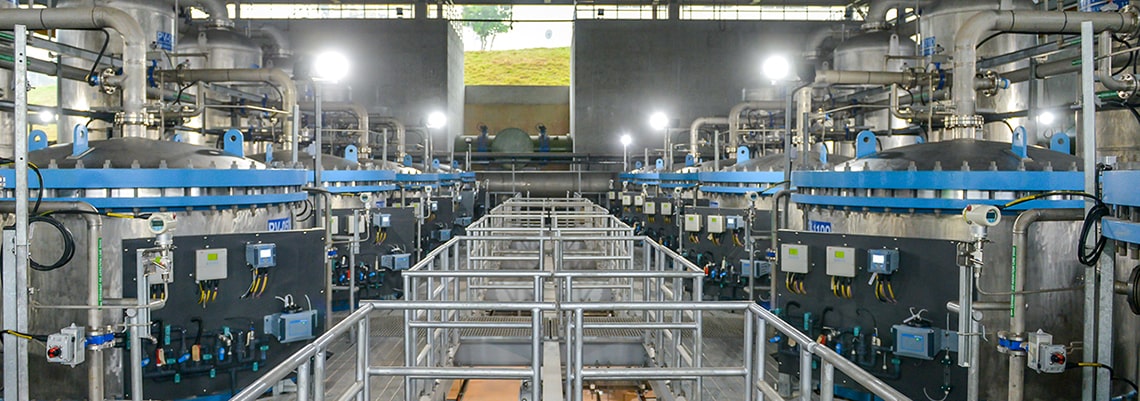VIDEO: Ceramic membranes go XL in Singapore
The Choa Chu Kang Waterworks in Singapore will be another key proving ground for large scale use of ceramic membranes for municipal water treatment.
World’s largest ceramic membrane project opens for business
Singapore’s water agency PUB has historically pushed the needle in multiple ways, especially in the acceptance of water reuse.
Now the organisation is adding large scale ceramic membranes to its history of impressive water developments.
The Choa Chu Kang Waterworks (CCKWW) has been officially opened as the “largest ceramic membrane system in the world”.
Project partners and technologies
Engineering consultancy Jacobs oversaw preliminary and detailed design, preparation and award of tenders, construction supervision, contract management, testing and commissioning of the plant.
As well as the ceramic membranes, ozone-biological activated carbon filters were also added to strengthen the disinfection and treatment process.
Jacobs said the technology combination would allow the plant to "process a wider range of water quality fluctuations”.
The Dutch company, PWNT – the technology arm of water utility PWN – provided the ceramic membranes through Japanese membrane company, Metawater.
One of Singapore’s oldest water treatment plants, CCKWW was built in two phases in 1975 and 1981, with a total capacity of up to 364,000 m3/day.
Back in the 1970s, Singapore relied on conventional sand filtration systems to process water, remove turbidity, bacteria and large suspended solids from water.
In 2008, CCKWW completed the first upgrade to replace sand filters with polymeric membranes.
The road to ceramic membranes
At the same time in 2008, PUB started working with industry partners to conduct trials on ceramic membrane technology.
It was in 2011 that results from the initial ceramic membranes pilot at the Bedok NEWater Factory were considered “encouraging”.
Built at the cost of S$5million (US$3.6m) with a capacity of 1,200 m3/day, the pilot plant tested the efficiency and reliability of ceramic membrane use in water treatment over 18-months.
It was in 2016 when the second upgrade of CCKWW pushed ceramic membranes on a larger scale.
A new facility was constructed over three years costing S$162 million (US$117.4m). This included the installation of ceramic membranes and the inclusion of ozone-BAC treatment for the plant.
In a press statement, PUB said ceramic membranes “are highly durable and expected to last 20 years; while polymeric membranes have to be replaced around every five years”.
The Singapore water agency estimates that water loss is reduced significantly from 5 per cent to 1 per cent using ceramic membranes.
Utility alliance to share ceramic operational data
During the opening of the Choa Chu Kang Waterworks, three utilities all currently deploying ceramic membrane systems in their water treatment plants signed a Memorandum of Understanding (MoU).
PUB, PWN from the Netherlands and South West Water (SWW) from the United Kingdom (UK) created a “Utilities Alliance” to share operational data and best practices on ceramic membrane systems for the next five years.
Other than Singapore’s CCKWW, the system is also used in PWN’s Andijk III plant in the Netherlands, which was opened in 2014 with a capacity of 120,000 m3/day.
SWW’s £60 million Mayflower Plant in Plymouth, UK is slated to open in the third quarter of 2019 and will be the first to combine multiple technologies including a resin regeneration system.
More upgrades to come in Singapore
Mr Ng Joo Hee, chief executive of PUB, said: "That we are able to deploy this new technology on such a large scale is the result of years of research, experimentation and rigorous testing.”
He added that the advanced technologies would enable the water agency to cope with the impact of "an increasingly urbanised catchment and the negative effects of climate change on Singapore’s raw water quality”.
PUB will progressively incorporate advanced water treatment processes in the other five water treatment plants in Singapore when they are due for an upgrade.
Chestnut Avenue Waterworks and Woodleigh Waterworks are currently undergoing upgrading to include ozone-BAC treatment in the water treatment process, which are expected to be completed by end 2019.
Related content
Loading component...
We promise never to send you spam and you can unsubscribe at any time!
